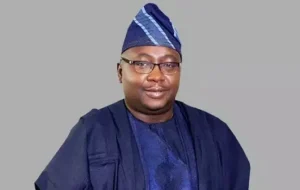
The Minister of Power, Adebayo Adelabu, has offered insights into the current electricity tariff situation, suggesting that rates for Band A consumers could see a reduction if the exchange rate falls below N1,000 to a dollar.
This statement comes in the wake of significant changes to the electricity subsidy policy.
On April 3, the Federal Government, via the Nigerian Electricity Regulatory Commission (NERC), declared the cessation of subsidies for Band A electricity consumers, leading to an increase in tariffs from N68 per kilowatt-hour (kWh) to N255/kWh.
Meanwhile, tariffs for other consumer bands remain unchanged.
Band A customers, who enjoy the most consistent power supply, now face the highest tariffs. This adjustment has sparked widespread discussion about the affordability of electricity and its implications for both residential and commercial users.
During his appearance on Channels TV, Minister Adelabu addressed concerns about these tariff hikes. He pointed out that, despite the increase, the cost of electricity for Band A consumers is still lower compared to the expenses associated with fueling generators, which many Nigerians rely on due to inconsistent power supply.
Furthermore, the minister emphasized that tariff adjustments are heavily influenced by fluctuating exchange rates, as much of the power sector’s costs are dollar-denominated. This includes the import of equipment and machinery necessary for power generation and distribution.
Minister Adelabu expressed optimism that should the Naira strengthen against the dollar, dropping below the threshold of N1,000 to a dollar, there could be a corresponding reduction in electricity tariffs. Such a development would alleviate some of the financial burdens faced by consumers, particularly those in Band A.
He said, “The tariff is flexible. I can tell you if the naira gains more and the exchange rate comes down below N1,000 to a dollar, it must positively affect the tariff; and the tariff, even for Band A, will come down below the N225/KWh that we are currently charging.
“There are variable factors that go into the composition of the tariff, and we are not closing our eyes to it. We are publishing it, we are transparent, we are talking to Nigerians and all the power sector stakeholders. This administration is very serious, and we are committed to transforming the sector.
“The problem we are having is an accumulated problem of over 50 years. It will not disappear in one year, but we’ve been making consistent and gradual progress.”
The minister stressed that efforts are ongoing to upgrade customers on other bands to Band A as power generation improves in the next six months.
The President Bola Tinubu administration has been heavily criticized for the recent electricity hike, and groups and individuals have called for a reversal of the decision.
The post Dollar Exchange Rate: Minister Of Power Reveals When Electricity Tariff Will Reduce appeared first on Naija News.

